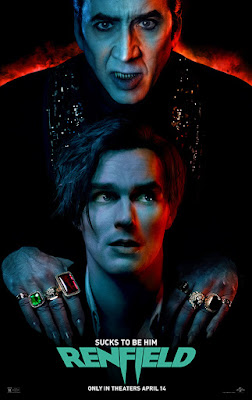You can't say Dracula’s familiar never got any recognition, because Alice Cooper wrote a ballad to Dwight Fry, who played the nervous bug-eater in the classic Bela Lugosi film. However, this will be the first time he carried his own film. Of course, the master does not take kindly to his attempts to assert his independence in Chris McKay’s Renfield, which opens today nationwide.
Having just survived another encounter with vampire hunters, Dracula is looking more like his old Max Schreck self, but worse. They have found a new lair in New Orleans, where Robert Montague Renfield is supposed to nurse him back to his full power, once again. However, he goes a bit off-script when he stumbles across a support group for people trapped in toxic co-dependent relationships. Renfield can definitely relate, so he starts preying on their manipulative narcissistic tormentors, instead of the innocents his master craves.
Renfield really goes rogue when he crosses paths with Rebecca Quincy, one of the few honest cops in New Orleans. Using the super strength and agility he gains from eating bugs (one of the few benefits of being a familiar) saves Quincy from a hit squad dispatched by the Lobo crime family. At first, she considers Renfield a hero, but then she connects him to Dracula’s victims. Despite her reservations, Renfield and Quincy will have to work together when Dracula forges a self-serving alliance with the Lobos.
Despite a considerable amount of gore, Renfield is definitely played for laughs, but its blood spurting gags are usually pretty funny. Yet, McKay and screenwriter Ryan Ridley (working off Robert Kirkman’s concept) show a lot of affinity and affection for the classic Universal Dracula films. The early flashbacks superimpose Nic Cage’s Dracula and Nicholas Hoult’s Renfield over scenes from the 1931 Lugosi classic. The score also incorporates excerpts of Tchaikovsky’s Swan Lake, just like Tod Browning’s film. Plus, what look like snippets of deleted scenes are recycled and given an early silent cinema look for Renfield’s closing credits.
Surely, Cage appreciated those touches. According to The Unbearable Weight of Massive Talent, The Cabinet of Dr. Caligari is his favorite film—and everyone that meta-comedy is more truth than fiction. Renfield is also set in his hometown of New Orleans, but viewers should understand they cannot just assume there will be open tables at Café du Monde, like Quincy does.











